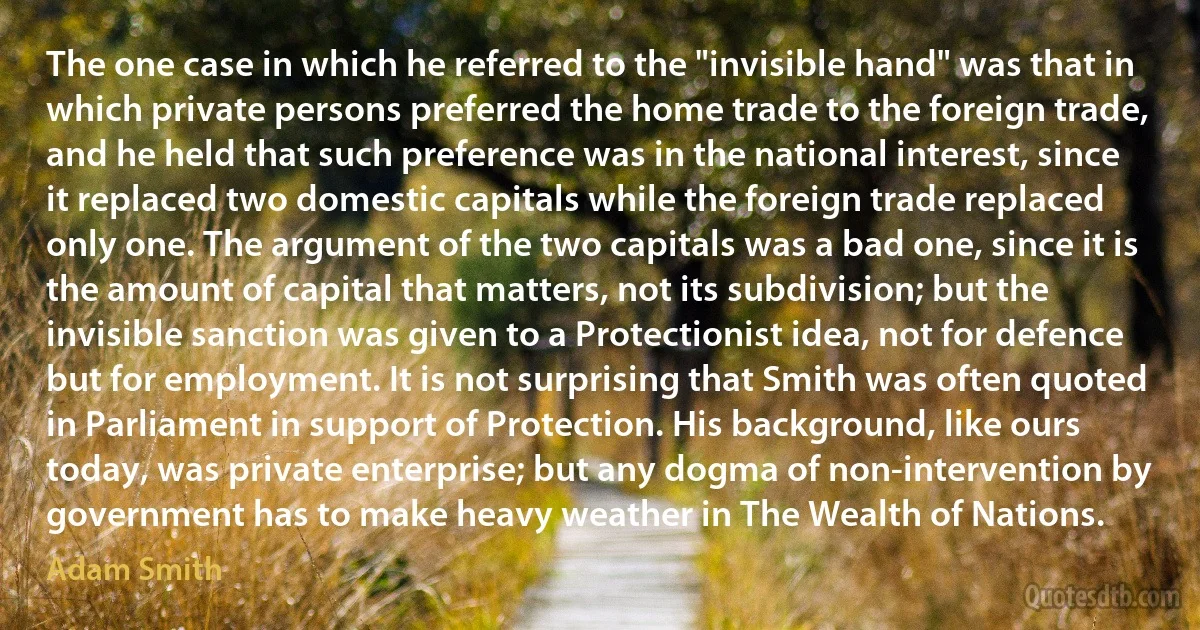
The one case in which he referred to the "invisible hand" was that in which private persons preferred the home trade to the foreign trade, and he held that such preference was in the national interest, since it replaced two domestic capitals while the foreign trade replaced only one. The argument of the two capitals was a bad one, since it is the amount of capital that matters, not its subdivision; but the invisible sanction was given to a Protectionist idea, not for defence but for employment. It is not surprising that Smith was often quoted in Parliament in support of Protection. His background, like ours today, was private enterprise; but any dogma of non-intervention by government has to make heavy weather in The Wealth of Nations.
Adam SmithRelated topics
argument bad case foreign given government hand heavy hold home idea interest national protectionist sanction subdivision support surprising trade wealth weather while todayRelated quotes
Of all kind of authors there are none I despise more than compilers, who search every where for shreds of other men's works, which they join to their own, like so many pieces of green turf in a garden: they are not at all superior to compositors in a printing house, who range the types, which, collected together, make a book, towards which they contribute nothing but the labours of the hand. I would have original writers respected, and it seems to me a kind of profanation to take those pieces from the sanctuary in which they reside, and to expose them to a contempt they do not deserve. When a man hath nothing new to say, why does not he hold his tongue? What business have we with this double employment?

Montesquieu
In order to touch the heart and gain the confidence, the assent, the adhesion, and the co-operation of the illiterate legions of the proletariat - and the vast majority of proletarians unfortunately still belong in this category - it is necessary to begin to speak to those workers not of the general sufferings of the international proletariat as a whole but of their particular, daily, altogether private misfortunes. It is necessary to speak to them of their own trade and the conditions of their work in the specific locality where they live; of the harsh conditions and long hours of their daily work, of the small pay, the meanness of their employer, the high cost of living, and how impossible it is for them properly to support and bring up a family.

Mikhail Bakunin
The distribution of wealth is one of today's most widely discussed and controversial issues. But what do we really know about its evolution over the long term? Do the dynamics of private capital accumulation inevitably lead to the concentration of wealth in ever fewer hands, as Karl Marx believed in the nineteenth century? Or do the balancing forces of growth, competition, and technological progress lead in later stages of development to reduced inequality and greater harmony among the classes, as Simon Kuznets thought in the twentieth century? What do we really know about how wealth and income have evolved since the eighteenth century, and what lessons can we derive from that knowledge for the century now under way?

Thomas Piketty
I imagine there will be great interest made for the eastern troops to be posted on the east side of the North River, to favor their recruiting. These reasons have something plausible in them, but I have my doubts with respect to their truth and reality. Men, when they are near home, are much more influenced by domestic attachments than they are when they are at a great distance. The friends and relations of the soldiers very seldom use their influence to engage them in the service. On the contrary, they commonly make use of every argument to dissuade them from it. I am of opinion, therefore, the further the troops are removed from home, the more favorable it will be to the recruiting service in camp.

Nathanael Greene
The people of South Dakota are taking the lead in the preparation of this memorial out of their meager resources, because the American spirit is strong among them. Their effort and courage entitles them to the sympathy and support of private beneficence and the national government. They realize fully that they have no means of succeeding in the development of their state except a strong reliance upon American institutions. They do not fail to appreciate their value. There is no power that can stay the progress of such a people. They are predestined to success. Our Country is fortunate in having the advantage of their citizenship. They have been pioneers in the development of their State. They will continue to be pioneers in the defense and development of American institutions.

Calvin Coolidge
